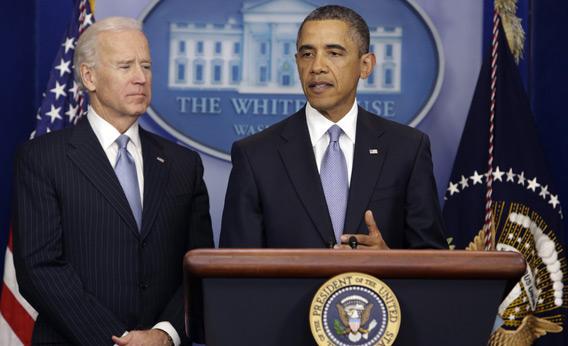With the fiscal cliff behind us, we now must look forward to yet another budgetary battle—over the debt ceiling, in a repeat of summer 2011. Is there a way out of the endless stalemate between President Obama and Republicans in Congress? Yes, but it requires the president to assert himself more aggressively than he has so far.
The debt standoff is more ominous than the fiscal cliff because it doesn’t reflect a legitimate dispute over public policy. While reasonable people can disagree about the right level of taxation and spending, no one believes that the United States should default on its debt, not even the most ardent Tea Partiers. So holding the debt ceiling hostage is pure brinkmanship—akin to threatening to set off a nuclear bomb in Manhattan if the president fails to agree to spending cuts.
House Republicans would probably argue that the main effect of maintaining the debt ceiling would be to force President Obama to cut spending while using tax revenues to pay interest on the debt. But cutting government programs to the degree necessary would also create a crisis— most people and institutions won’t want to do business with the government, or work for it, because they won’t trust it to do what it promises. This is a mess and a bad way to run a country. So what can be done?
One argument that has received some attention rests on an obscure provision in the 14th Amendment of the Constitution. It says that “The validity of the public debt of the United States … shall not be questioned.” Some commentators, like former President Clinton, argue that this clause authorizes the president to borrow money to meet existing obligations. But the provision does not mention the president or give him any authority. And in Article I, the Constitution gives the authority to borrow money to Congress. The 14th Amendment states an aspiration or goal, which would not normally trump a specific allocation of constitutional powers. The argument also fails on its own terms because the debt ceiling does not force the president to default on the public debt; he can avoid default by spending less.
Two law professors, Neil Buchanan and Michael Dorf, have argued that the president is actually constitutionally required to violate the debt ceiling rather than cut spending. To respect Congress’ will, he should follow its orders to spend rather than follow its orders not to borrow—the idea is that the spending power is somehow constitutionally fundamental to what Congress does, while the borrowing power is not. I say “somehow” because Buchanan and Dorf do not explain convincingly why that would be so.
President Obama can make a better argument. Congress has given him an impossible task: to implement a large number of costly public projects with less money than those projects cost. If he cuts spending, then he violates constitutional norms that give Congress the power to determine spending. If he raises revenues by borrowing or trying to tax people, then he violates constitutionals norms that give Congress the power to borrow or tax. In the face of contradictory instructions from Congress, the president can’t avoid choosing—by virtue of his administrative role as collector and disburser of revenues, the president must do something. Where Congress fails to provide him with consistent instructions, he has the discretion to do what he believes is in the public interest. If the economy were to be on the point of collapse, he could cite emergency powers sanctified by tradition as his authority for borrowing beyond the debt ceiling on his own. But a less drastic argument is that the power to resolve conflicting congressional orders is inherent in the president’s administrative role. Indeed, presidents frequently face conflicting statutes as they govern, and they have long enjoyed a great deal of discretion in resolving them.
So in the face of contradictory orders from Congress, President Obama should do what he believes is in the public interest. And if the House refuses to raise the debt ceiling, this surely means some combination of cutting spending, borrowing beyond the debt limit, and perhaps even searching out new sources of revenue.
Theodore Roosevelt famously advanced the modern view of the presidency, which he called the “stewardship” theory: The president should act in the public interest as he interprets it except when constrained by the Constitution or a specific act of Congress. He should not twiddle his thumbs waiting for lawmakers to get their act together. Roosevelt had in mind situations in which urgent action by the government is called for but Congress has failed to provide him with legal authority. President Obama faces a more complex setting, with Congress giving him contradictory instructions rather than no instructions at all. But for government to function, the dysfunctional institutions within it must give way. The president has spoken softly for long enough; now it is time for him to wield the big stick and raise the debt ceiling on his own.
